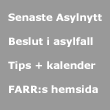ASYLNYTT
Sponsrad av Fridh Advokatbyrå
ARKIV:
EU:s flykting- och gränspolitik
Allmänt om migration, statistik

Asylnytt - Arkiv
Tvångsmedel, hot och deportationer
Förvarstagande och uppsikt
Klipp från media
Länk till information från myndigheter och organisationer
- Arkiveringsdatum 210720:
- After the 'Refugee Crisis': ECtHR Deference to State Sovereignty in Detention Cases
Arkiveringsdatum 220215:
Sveriges Radio Dalarna 22-01-27:
Överfullt hos Migrationsverket - polisen kan inte utföra utvisningar
Brist på förvarsplatser hos Migrationsverket och pandemin gör det svårt att utvisa folk ur landet.
Bara fyra av de nio byggarbetare som greps i razzian mot illegal byggarbetskraft på Idre fjäll i veckan kunde föras till förvar.
"Vi kan inte göra jobbet lika effektivt som om det hade funnits fler förvarsplatser", säger Ulrica Granberg, chef för gränspolissektionen i region Bergslagen.
Hela inslaget (Extern länk)
Arkiveringsdatum 210720:
EU Migration Law Blog 21-07-12:
After the 'Refugee Crisis': ECtHR Deference to State Sovereignty in Detention Cases
Juan Ruiz Ramos, PhD Candidate at Universidad de Granada
The 'Strasbourg reversal' is an intriguing concept in European human rights law. According to this theory, developed by Marie Dembour in When Humans Become Migrants, the European Court of Human Rights (ECtHR) always begins its analysis of a migration-related case with the statement that States have a 'right to control the entry of non-nationals into its territory'. By doing this, the Court grants States greater leeway to enact potentially rights-violating policies than in cases in which the applicant is a national of the defendant state. Having been taught that human rights are universal, the idea that some individuals are more entitled to human rights than others (paraphrasing George Orwell) fractures one's idealistic conception of human rights law.
The most plausible explanation for the existence of the Strasbourg reversal is the fact that the Court reacts to political pressures coming from States who do not wish to see a supranational institution intervene in sensitive political issues such as migration (see here and here). In this vein, I analysed in an article last year whether the political tensions deriving from the 2015 'refugee crisis' led the Court to become even more deferential to States' practices in an area which is particularly troublesome in terms of human rights protection: the detention of asylum-seekers. To this end, the article carries out a systematic review of the judgments on the matter rendered between 2015 and the first months of 2020. The focus of the analysis is on the Court's case law under Article 5(1)(f) (the exception to the right to liberty for purposes of migration control) and Article 3 ECHR (prohibition of degrading treatment in relation to detention conditions).
Hela artikeln (Extern länk)
Källor: Informationen på denna sida är hämtad från följande källor (externa länkar): EU (kommissionen, ministerrådet, parlamentet och domstolen), Europarådet (mr-kommissionären, domstolen, kommittén mot tortyr), FN:s flyktingkommissariat UNHCR, FN:s kommitté mot tortyr m.fl. FN-organ, Sveriges Radio, SvT, andra svenska media via Nyhetsfilter och pressmeddelanden via Newsdesk, utländska media till exempel via Are You Syrious och Rights in Exile, internationella organisationer som Amnesty International, Human Rights Watch, ECRE, Statewatch och Picum, organisationer i Sverige som Rädda Barnen, Asylrättscentrum, Svenska Amnesty, FARR och #vistårinteut samt myndigheter och politiska organ som Migrationsverket, Sveriges domstolar, JO, Justitiedepartementet m.fl. departement och Sveriges Riksdag.
Bevakning: Hjalte Lagercrantz och Sanna Vestin. Sammanställning: Sanna Vestin. Asylnytt är ett ideellt projekt. Sponsring avser prenumerationsavgifter. Tips emottages tacksamt.

 innehåll
innehåll